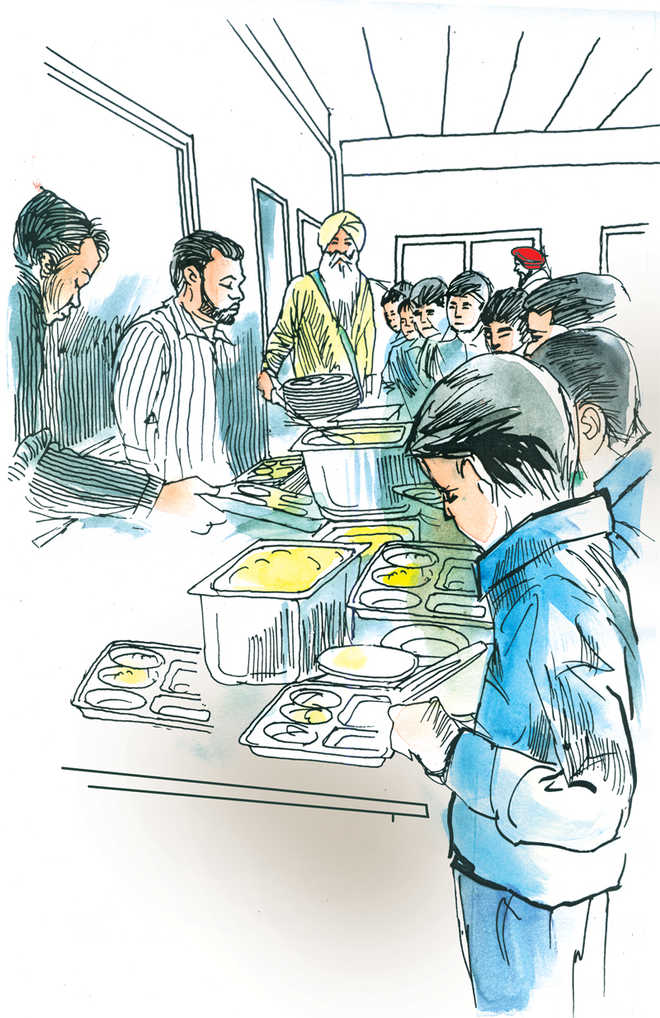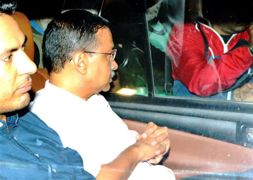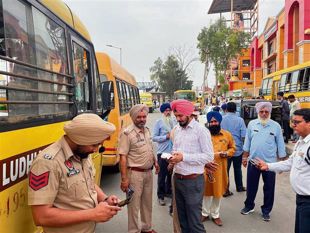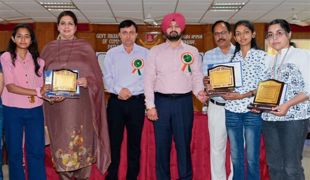
Illustration by Sandeep Joshi
Harish Khare
A few days ago I fulfilled a long-standing commitment to visit an “adopted” village, Moonak in Sangrur district of Punjab. The man who made me make a three-hour drive to this otherwise indistinct village is a Chandigarh-based businessman and a friend of mine, Mr R.K. Garg. The bait was that I would be asked to inaugurate a mid-day meal block in the Government School. The lure of having a plaque in my name was not sufficient enough a reason to spend six hours on the road; but what took me to Moonak was the journalist’s sense of curiosity, to see for myself and test the veracity of claims of “good work” done by Mr Garg in the village.
The claims, in fact, were vastly understated. What immediately strikes a visitor to Moonak is the total absence of garbage on the roads, which is the signature introduction to all our towns, big and small. Mr Garg, I was told, had been instigating an awareness drive about cleanliness and has donated dozens and dozens of garbage bins for each household. The village in a way is a successful model of Prime Minister Narendra Modi’s Swachh Bharat abhiyan.
Mr Garg is also patronising preservation and restoration of a sixteenth century fort, which is now in complete ruins, with most parts of its sprawling ground being familiarly encroached upon by villagers. The local leadership and Mr Garg have joined forces to retrieve at least some of the land and work is in progress to make the reclaimed area into a modern park. Hopefully, it will become a kind of public square for the elders to congregate and chaupalise.
But it was obvious that Mr Garg took the greatest of pride in what he has done for the village’s primary-secondary school cluster. Money has been poured into making pucca school buildings, boundary walls have been put up, benches provided in each classroom for the students and teachers -- a rare example of a government school so well provided for.
At the girls’ school, the principal had a modern office to herself, as well as a conference room, with pictures of national icons -- Gandhi, Nehru, Bhagat Singh, Mother Teresa, Kalpana Chawla, etc. -- adorning the walls. At the boys’ school, the same concern for providing an appropriate learning environment for the students. I was told that the school has acquired a reputation for itself in the neighbouring villages as well, and many students from “private” schools have migrated to this school.
The highlight of the visit was the inauguration of a newly added mid-day meal block. Thanks to Mr. Garg’s generosity, the kitchen had a clean-as-a-whistle look to it; with an innovative roti-making machine, capable of making 100 chapatis in minutes. And, the dining hall was a sparkling, inviting proposition, with gleaming steel utensils and tables, trays and glasses. I doubt if mid-day meal experience could be made any more joyful -- or dignified -- an hour than at this government school.
I was shown the benches Mr. Garg used to occupy as a student in 9th and 10th class. I had a feeling that somewhere there was a noble instinct at work – how to repay a debt to the society. Understated, unboastful, yet philanthropy at its best -- making a difference.
* * * * * * * *
MY friend, Suman Dubey was kind enough to send me a copy of a commemorative publication brought out by the publishers of the National Herald. It is a special print edition of the National Herald, “India at a Crossroads -- 70 years of Independence.”
Thanks to the ruling establishment’s vindictive politics, the National Herald has been in the news for all the wrong reasons. Well, politicians will be politicians.
The National Herald was a great newspaper, once upon a time, set up by Jawaharlal Nehru. The commemorative publication reprints a July 1964 piece by the iconic editor, M Chalapathi Rau (who edited Herald from 1946 to 1978); in this piece, written after Nehru’s death, “MC” talks of Nehru’s commitment to the freedom of the Press. It was this commitment -- a cultivated tolerance for disagreement and dissent -- that led to the consolidation of the democratic project in the post-Independent India.
During the freedom struggle days, the newspaper was an influential platform available to nationalist leaders and sympathisers. The story of its decline is the story of mismanagement by Congressmen of public trust and office. It has now reinvented itself as a digital newspaper and offers a counter-voice to the dominant narrative.
The commemorative publication was released by President Pranab Mukherjee a few days ago. It is much than a publishing milestone. It is a political statement and it brings together individuals and voices who refuse to feel intimidated by the ruling establishment.
And, the list of contributors should bring joy to the entire liberal and democratic community that has been feeling bewildered as to what has happened to independent voices and why these voices had chosen to become so muted.
There is Rajmohan Gandhi reminding us of Tagore’s celebration of “the mind without fear”, there is Ashis Nandy talking of relationship between State and Civil Society, Sitaram Yechury dissecting the right-wing’s vision of a Hindu Rashtra, Ashok Vajpeyi on politics of culture and nationalism, Shivshankar Menon on meaning of strategic autonomy, Shyam Saran on India’s approach to Pakistan, and, Apoorvand on Secularism, and many others.
Make no mistake about it; it is a collector’s item for the simple reason that it offers sane, sober and sagacious expressions to our finer and nobler instincts.
There is a certain reassuring feel to this publication — that not all have made their peace with the creeping culture of intolerance and intimidation. That can only be good news for the republic.
* * * * * * * *
A new tax regime called the GST has been introduced. The government and its apologists want us to believe that it is the most revolutionary development since August 1947; the evidence from the ground is one of pain and confusion.
Captain Amar Jeet Kumar, a Mohali-based environmentalist and spirited citizen and a reader of this column, has sent a poem he penned on the plight of the farming community. In anguish he writes:
The farmer is the only person in our economy, who sells his products in wholesale and buys everything in retail. This government especially the Prime Minister had promised to fix the rate of what he produces 50 per cent more than the minimum support price (MSP). This has not been honoured. The farmer, who is engaged in a priority sector activity, that is farming, has been hit hard with this GST regime:
Tax his land, tax his wage,
Tax his bed in which he lays.
Tax his tractor, tax his mule,
Teach him taxes is the rule.
Tax his cow, tax his goat,
Tax his pants, tax his coat.
Tax his ties, tax his shirts,
Tax his work, tax his dirt.
Tax his chew, tax his smoke,
Teach him taxes are no joke.
Tax his car, tax his ass
Tax the roads he must pass.
Tax his tobacco, tax his drink,
Tax him if he tries to think.
Tax his booze, tax his beers,
If he cries, tax his tears.
Tax his bills, tax his gas,
Tax his notes, tax his cash.
Tax him good and let him know
That after taxes, he has no dough.
If he hollers, tax him more,
Tax him until he's good and sore.
Tax his coffin, tax his grave,
Tax the earth in which he lays.
Put these words upon his tomb,
“Taxes drove me to my doom!”
And when he’s gone, we won't relax,
We'll still be after the inheritance TAX!
Well said, Captain Sahib.
At Moonak, within the precincts of the 450-year-old fort there is a mazzar. It is revered and visited both by the Hindus and the Muslims. In fact, the caretaker happens to be a Hindu. I was also told of a charming, centuries-old tradition: irrespective of the name, flag or the colour of the ruler’s turban, the local police chief (SHO) and his team ritually visit and pay obeisance at the mazzar every Thursday. The local legend has it that the mazzar provides inspiration for social harmony in the village.
A fine example of togetherness that has underpinned Indian civilisation in village after village over the centuries.
I raise my cup of coffee to this wonderful, enduring heritage. Join me.



























